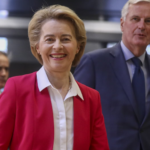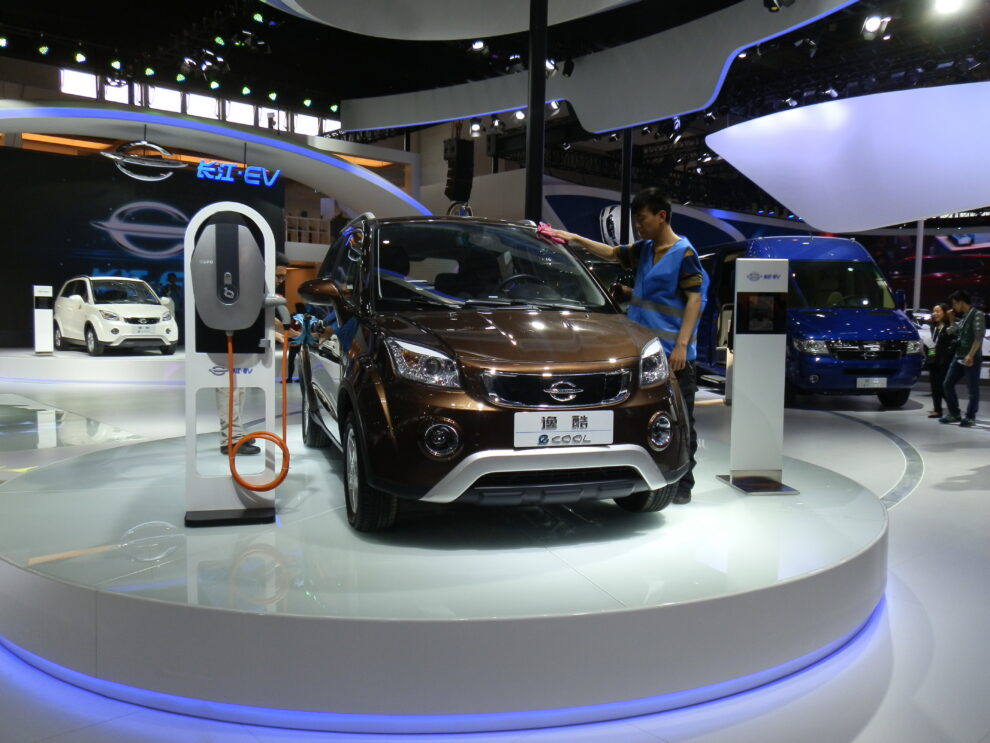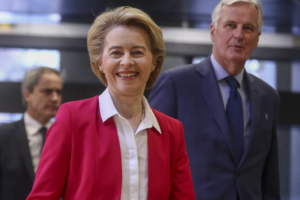The European Commission’s anti-subsidy investigation into China’s electric vehicles (EV) has cast a dark cloud over an emerging EV sector considered essential to the global fight against climate change, as the expectations of additional duties could result in immediate buyer hesitation among European importers, while also distorting prices and disrupting supplies in the long run.
When speaking at her annual State of the Union address at the European Parliament in Strasbourg, President Ursula von der Leyen reiterated her « de-risk approach » to dealing with ties between the European Union (EU) and China, claiming the prices of EVs from China have been « kept artificially low by huge state subsidies. »
She insisted that the inflow of Chinese products is « distorting » the EU market, labeling what is ahead as « a race to the bottom. »
As soon as this news came out, the Chinese government, business organizations and auto and law specialists voiced their objections to the EU’s move, and also expressed deep concern about the future of the global EV industry.
A spokesperson with China’s Ministry of Commerce (MOC) said that the investigation proposed by the EU is a practice of pure « protectionism » that is intended, in essence, to protect the EU’s own industry in the name of « fair competition. »
The probe will seriously disrupt and distort global automotive industrial and supply chains, including those in the EU, and it will have a negative impact on China-EU economic and trade relations, the spokesperson said.
China Chamber of Commerce to the EU (CCCEU), an industrial association comprising nearly 1,000 Chinese firms in the EU, has urged the EU to approach the progress of China’s EV industry with objectivity, rather than resorting to unilateral economic and trade measures that could obstruct the development and elevate operational expenses of Chinese EV products within the European market.
TRADE PROTECTION
A trade remedy team of the Beijing-based Dentons Law Firm noted that back in mid-June, European Commission officials had revealed the intention of launching trade remedy investigations into China’s EVs, but EU members were at loggerheads over taking trade measures against China’s high-end mechanical and electrical products.
Sun Lei, senior partner with Dentons, said there were multiple reasons for the EU’s bypassing of anti-dumping and conducting only a countervailing probe.
One factor could be the fact that the preliminary ruling and investigations for an anti-subsidy probe takes significantly shorter time than that for anti-dumping, which may be conducive to the EU’s rapid implementation of trade protection measures, Sun noted.
« The commission can initiate an investigation on its own. But such an ex officio initiation without having received a complaint is more likely to be politically inclined, » Sun said.
« It is noteworthy that the electric vehicle industry in China enjoys a robust cooperative partnership with the European and global automotive industry networks, and the creation of each electric vehicle involves the collaborative efforts of tens of thousands of suppliers from around the world, » said the CCCEU.
« Duties are at the core of countervailing measures. The levels of the duties will not affect market demand, but will change the structure of supplies. The repercussions for the EU’s own industry will depend on the extent to which it has been integrated with Chinese EV industrial chains, » Sun said.
China’s new energy vehicle (NEV) exports surged 90 percent year on year in 2022, with orders from Europe accounting for 48 percent of the total. In the first eight months of this year, the country exported 727,000 NEVs, an increase of 110 percent from a year ago.
Mei Xinyu, a researcher with the Chinese Academy of International Trade and Economic Cooperation under the MOC, attributed the rapid expansion of China’s new energy vehicle industry to its world-leading technological innovation, and the virtuous circle between large-scale production and mass sales.
The so-called « de-risk » approach will do nothing but deliver self-inflicted disruptions to the EU’s auto supply and will drive up prices, which will end up hurting the competitiveness of its local automakers, Mei said.
The EU’s commitment to market openness must be translated into tangible measures, ensuring a fair, impartial, and non-discriminatory business environment for foreign companies, the CCCEU said, cautioning that efforts to restrict products solely based on their country of origin would run counter to the EU’s WTO commitments.
INDUSTRIAL OPPOSITION
China has established the world’s largest NEV sales market and production center within a very short space of time, and this would not have been possible without its non-discriminatory stimulus policies, Mei said.
Mei highlighted the building of a big sales market as key to developing local EV industry, saying that it will attract investors to make bigger investments in setting up factories, scaling up production and sharpening international competitiveness.
From that perspective, adopting non-discriminatory stimulus policies in a certain development stage is a right path to fostering the domestic EV market, Mei said.
Cui Dongshu, secretary general of the China Passenger Car Association, also expressed opposition to the EU’s comments on China-made NEVs.
The strong export of China’s NEVs is well underpinned by its industrial chain, which has built up its strength under full market competition, not state subsidies, Cui said.
« Chinese EV manufacturers, along with their upstream and downstream industry partners, have persistently pushed the boundaries of innovation. This concerted effort has resulted in a substantial industrial edge within both the fiercely competitive domestic Chinese market and the global arena, » the CCCEU said.
It’s crucial to emphasize that this advantage is not a product of ‘huge state subsidies’ as claimed by the commission, the chamber added.
According to Cui, the key to evaluating anti-dumping or anti-subsidy investigations is finding evidence of material injury caused by low-priced goods to local industries, but the prices of China-made cars exported to Europe are now nearly double that found in China.
Such anti-subsidy probes are inevitable as China’s NEV industry becomes stronger, the secretary general said. « When you’re strong, people will notice and some might feel uncomfortable with that. »
THE WAY OUT
Experts said that the EU’s attitude towards China’s electric vehicles also exposed its concern over the unbalanced trade between China and the EU.
China’s trade surplus with the EU is a natural result under the combined influence of different industrial structures, industrial specialization, ways of trade and external factors, a Foreign Ministry spokesperson said previously.
According to the spokesperson, EU restrictions on the export of high-tech products to China in recent years directly limited the EU’s ability to tap the potential of exports to China and led to unbalanced trade between the two sides.
In a world of rising protectionism and trade fragmentation, leveraging unilateral economic and trade measures at will is not a good strategy for helping to solve the bottlenecks of a country’s industry development.
To solve the problem fundamentally, China and the EU need to find common interests, strengthen dialogue and cooperation, and jointly promote institutional openness and alignment of rules while opening up trade, Sun said.
China always maintains an open and cooperative attitude, and welcomes EU automotive companies to expand their investment in the country, including investment in electric vehicles, said the spokesperson with the MOC.
China urged the EU to conduct dialogue and consultation with China, taking into consideration the bigger picture of maintaining the China-EU comprehensive strategic partnership and the stability of global industrial and supply chains, the spokesperson said.
The two sides should work together to create a fair, non-discriminatory and predictable market environment for the common development of the China-EU electric vehicle industry, oppose trade protectionism, and commit to global efforts to address climate change and achieve carbon neutrality, the spokesperson said.
China will pay close attention to the EU’s protectionist inclinations and follow-up actions, and firmly safeguard the legitimate rights and interests of Chinese enterprises, the spokesperson added.





































